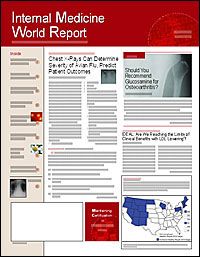Nasal Flu Vaccine Gets High Marks for Safety
A close look at data collected during the first 2 years of experience with the intranasal influenza vaccine has determined that there were no unexpected serious adverse effects when the vaccine was used properly.
The study (JAMA. 2005;294:2720-2725) began with a search of the US Vaccine Event Reporting System (VAERS) database for all side effects reported in association with the use of the trivalent live, attenuated influenza vaccine (LAIV-T; FluMist) starting at the time it was licensed in June 2003 and ending with the 2004-2005 flu season. During that time, about 2.5 million ?people received the vaccine?500,000 during the 2003- 2004 influenza ?season and about 2 million during the 2004-2005 influenza season.
A total of 460 adverse events were reported during the study period, 283 of which were received during the first 2003-2004 flu season. There were no deaths, but 40 of the reports were regarded as serious (defined as, in addition to death, life-threatening illness, hospitalization or prolongation of hospitalization, permanent disability, or any event that required a medical intervention to prevent one of these outcomes).
The most common serious events were asthma and pneumonia (5 reports each); followed by possible anaphylaxis, other allergic events, and Guillain-Barr? syndrome (3 each); and influenzalike illness and pericarditis (2 each).
Overall, 12% of the 460 reports were classified as allergic events, including 7 cases of possible anaphylaxis, 4 of which involved throat swelling (2 were serious) and 1 of which involved periorbital swelling. However, hospitalization was not required in any of these cases.
"The [8] reports of asthma exacerbations in vaccinees with prior asthma history highlight the potential risks of not ?following the approved indications and support the need for continued close surveillance for asthma exacerbations following use of this vaccine," wrote Hector S. Izurieta, MD, MPH, of the Center for Biologics Evaluation and Re?search, FDA, Rockville, Md, and the National Immuni?zation Office of the Centers for Disease Control and Pre?vention, Atlanta, Ga, and colleagues.
They pointed to 18 reports of vaccine administration errors (eg, giving children 2 doses instead of 1, vaccinating a pregnant women) as further evidence of the need for physicians to carefully read the package insert before using the vaccine.
The authors of an accompanying editorial (pages 2763-2765), Kathleen M. Neuzil, MD, MPH, of the Program for Appropriate Technology in Health and the Department of Medicine, University of Washington, Seattle, and Marie R. Griffin, MD, MPH, of the Department of Preventive Medicine, Vanderbilt University School of Medicine, Nashville, Tenn, said that "the cumulative evidence, including the VAERS experience, should reassure clinicians and patients of the safety of both licensed influenza vaccines."
While noting that the 22 reports to VAERS of secondary transmission to unvaccinated contacts were of concern, they emphasized that the vaccine "represents an important option to increase ?vaccination rates among healthy persons for their own protection and for the protection of those with whom they have close contact."
Drs Neuzil and Griffin listed 3 main advantages of LAIV-T:
? Intranasal route of administration
? Induction of both mucosal and systemic immune responses
? Evidence of efficacy during flu seasons in which there are mismatches between the vaccine and circulating influenza strains.
Nasal Flu Vaccine: Contraindications, Warnings
Contraindications
? Do not administer parenterally
? Do not administer to individuals with a history of hypersensitivity, especially anaphylactic reactions, to any component of the vaccine, including eggs or egg products
? Do not administer to children and adolescents aged 5-17 years receiving aspirin or aspirin-containing therapy
? Do not administer to individuals with a history of Guillain-Barr? syndrome
? Do not administer to individuals with known or suspected immune compromise
Warnings ? Should not be administered to individuals with a history of asthma or reactive airways disease
? Should not be administered to individuals with medical conditions (eg, chronic cardiovascular pulmonary disorders, pregnancy, chronic metabolic diseases including diabetes, renal dysfunction, hemoglobinopathies) that may predispose to severe disease following wild-type influenza infection
Source: FluMist. Gaithersburg, Md: MedImmune Vaccines; 2005.
